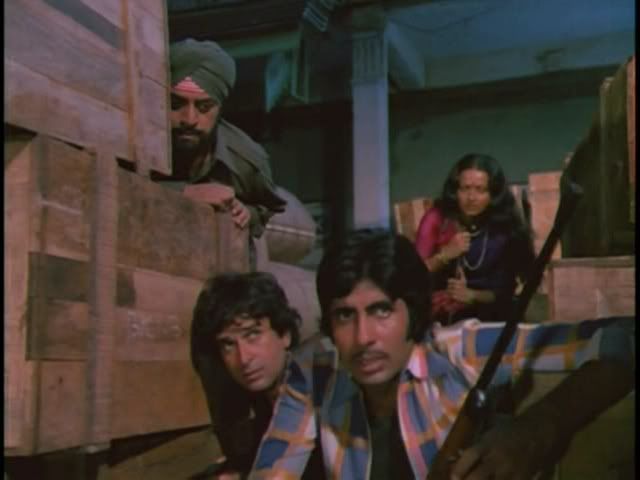
The whole gang.
Salim and Javed's Immaan Dharam is a similarly forgotten classic. Salim and Javed, who became much more famous for films like Deewaar, must have written this on the back of a napkin. Heck, even the DVD description thinks it's crap:
The story is about two guys (Amitabh Bachchan) and Ram (Shashi Kapoor), who act as mock witnesses. These two are always around court and give evidence as per the requirement of the case every time. They never believe in God but in the end they have to accept the power of God. Helen's only performance as a heroine with Amitabh Bachchan. The main attraction of the film is the star cast.
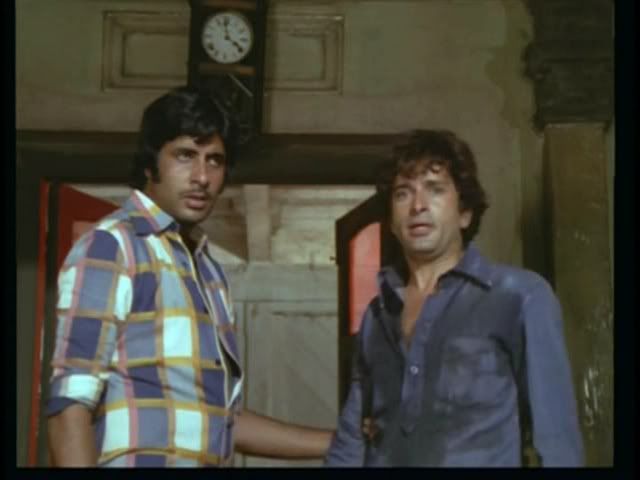
Yeah, they are pretty attractive. Forgive Shashi's sweat, he has the flu in this scene.
Yet we've seen Deewaar and, hold your stones, we prefer Immaan Dharam. Why? Because Deewaar has the unnecessary weight of Classic tied to it, it has Messages and Meaning that never quite captured us and that are, admittedly, a bit of a downer. We always felt at a distance with it, always too reminded that we were watching something Important. Immaan Dharam has no such pretensions. You just expect it to be light-hearted crap and then are pleasantly surprised by how compelling it can get.
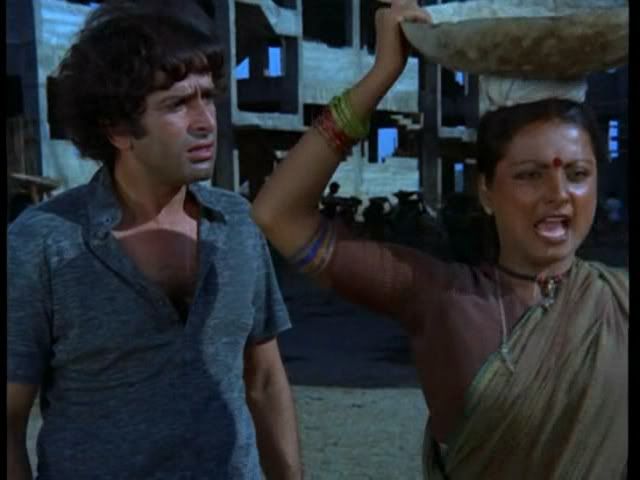
Shahekha? Rekhashi?
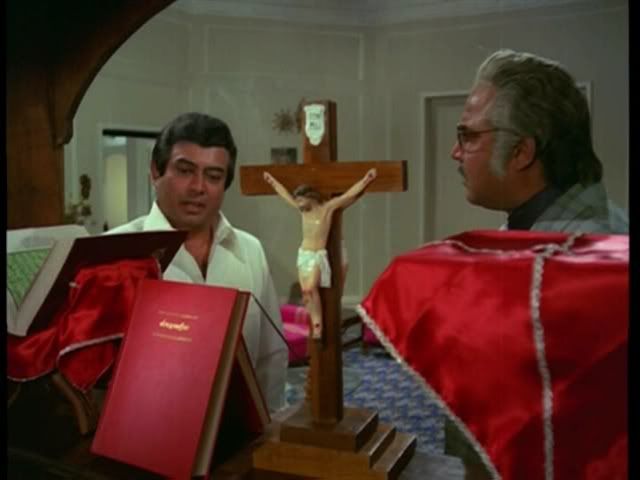
There's a lotta morality going on in that room.
Like Kaala Patthar, it's quiet and gritty and has a great ensemble (with the notable exception of Sanjeev Kumar's character, more on that later). Like Kaala Patthar, there are no arch-villains except for the anti-social kinds: the local thugs, rapists, and so forth. In fact, maybe it's the poverty of the two films that appeals so much to us. No, no, this is not poverty pornography à la Chakra, where that's the point of watching the film. In Immaan Dharam, like in Kaala Patthar, Amitabh and Shashi's shirts are a bit soiled, Rekha's saree is notably lacking all its usual flashiness, and everyone looks just a little bit sweaty. But it's not glorified or too much dwelled on. Rather, it's merely the unassuming background. These are characters who will work hard for a buck and, in the case of Amitabh and Shashi's characters, Ahmed and Mohan, bend their moral rules for a buck too. These aren't those wet dreams of wealth that current Bollywood seems to be so preoccupied with (Kabhie Khushi Kabhie Gham... Kal Ho Na Ho... or anything by Karan Johar really), nor is anyone ridiculously archetypal and Good or Bad (with the notable exception, again, of Sanjeev Kumar's character). Instead, these are films that have massive song and dance numbers incorporating the poorest of the proletariat; Kaala Patthar's Dhoom Mache Dhoom, for example, which featured scores of dancing coal miners celebrating their recent union victory against an evil mine owner, and Imaan Dharam's Koncam Koncam, which features hundreds (!) of construction workers serving as chorus to the love between the two-bit rough Mohan (Shashi Kapoor) and his Tamil love, Durga (Rekha). It's so, so beautiful.
Of course it should be the cruelty of the Internet that this one song, which we feel fully captures the greatness of Immaan Dharam and also is just incredibly sweet for its Shashi-Rekha (Shashekha? Rekhashi?) cuteness and working class background, should be unavailable on YouTube and the usual video sites. Unfortunately screencaps will just have to suffice. And we'll hum along.
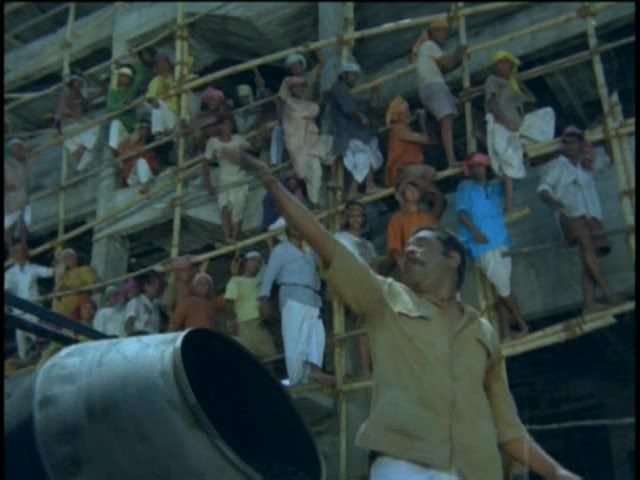
Hmmm HMMMMMMM.
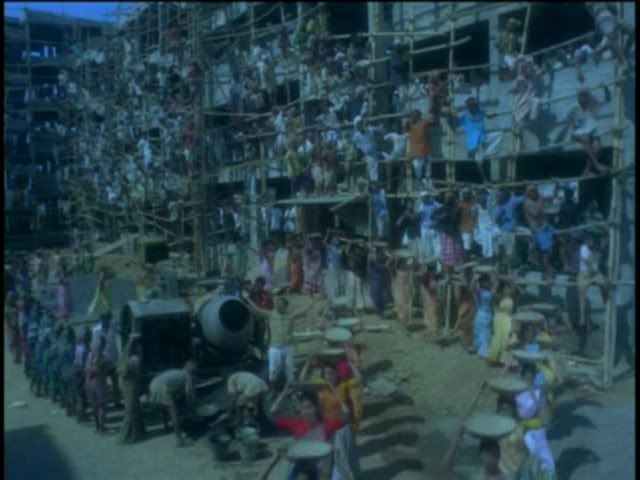
Hmmm hmmm HMMMMM.
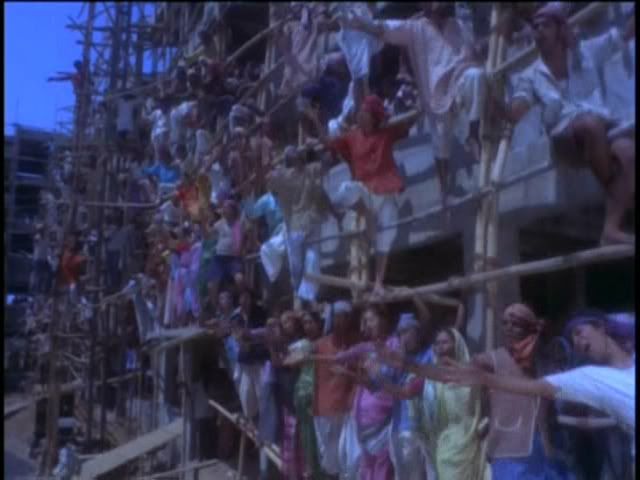
Hmmm HMMMMMM. (HMM HMM)
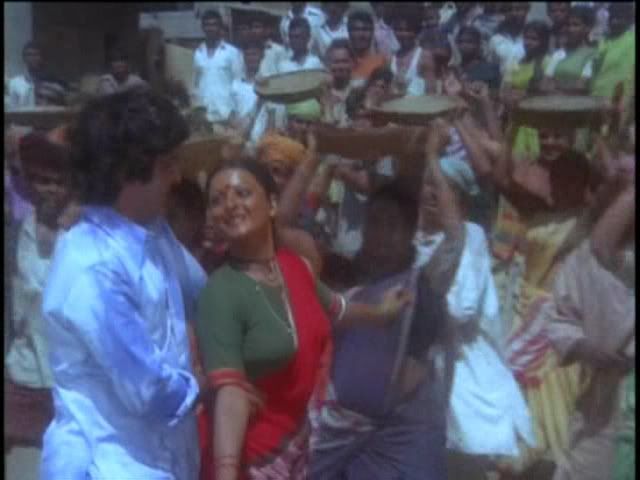
Hmmm HMMMM hmmmmmmmm.
Isn't it great?! You need to get your hands on this DVD, if only for this song. The lyrics are saying, first in Tamil and then in Hindi, how "little by little" they fell in love. Allow us to gush: gush, gush!
Apart from poverty, the film also features another favorite theme of the PPCC: religion. As you will soon know from our viewing of Suhaag, we just love to see handsome men partaking in pooja or praising Allah. And we are always keen to see actors like Shah Rukh Khan play explicitly Muslim characters (as in, for example, Chak De India and, Allah be praised, the upcoming My Name is Khan) with their wailing qawwali background, their (dare we say it) culture, rather than a bland non-entity of religionness as in... well, the Karan Johar movies.
Immaan Dharam is actually full of such active religiosity, as well as generous helpings of moral themes. In fact, it seems the main theme of the film is morality and how religions come into play. In the beginning, Amitabh and Shashi often swear on their respective holy books, the Qur'an and the Bhagavat Gita, and lie - giving testimony as false witnesses. Sanjeev Kumar's character engages in seemingly ceaseless moral pontificating, and spends most of the film reading from the Qur'an, Gita or Bible, and then beating us over the head with his pluralism. Hey, we're all about pluralism, but his indignation can be pretty irritating at times too.
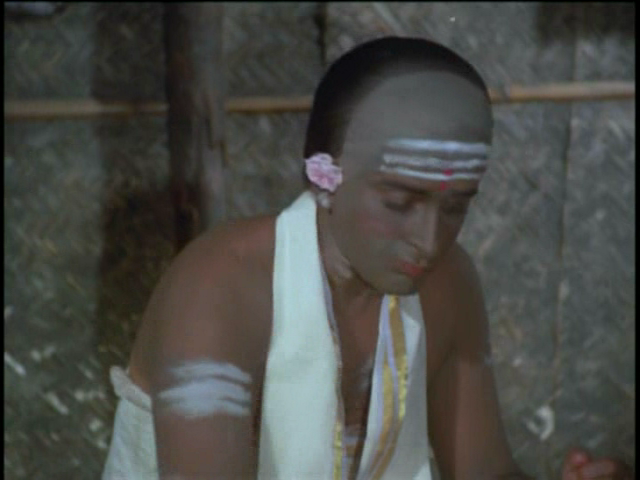
How Durga sees Mohan.
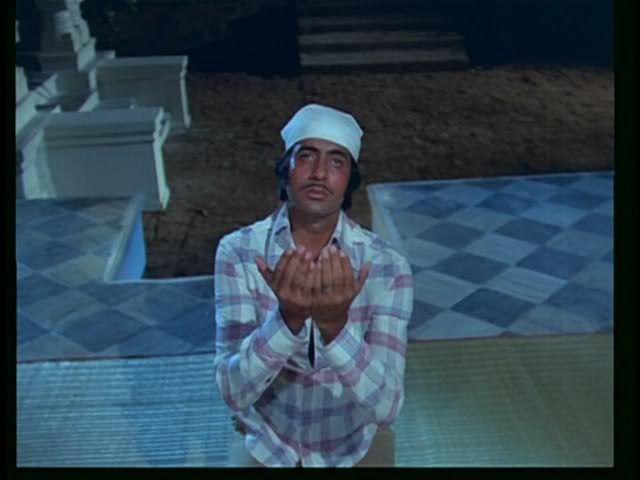
Ahmed reconnecting with his Muslim roots (and Amitabh uncharacteristically playing a Muslim).
Nonetheless, there are gorgeous moments when, after Sanjeev has properly converted Ahmed and Mohan back to their respective religions of Islam and Hinduism, the two of them have moments wherein they are given the holy book not of their own religion and then they both respect and revere it as their own. We at the PPCC die for these types of scenes. It's just so touching. It's like Om's necklace in Om Shanti Om.
In Amitabh's scene, Ahmed the Muslim is asked by his blind Hindu friend, Shyamlee, to read from the Gita. He pauses before pulling the book from the shelf and then uses a handkerchief to cover his head. "In my religion," he says, "we are taught to cover our heads when touching holy books."
In Shashi's scene, Mohan the Hindu watches his Muslim friend die horribly in the street, baking in the hot sun on the pavement. The friend begs him to take the Qur'an, his only possession, from his home. Mohan does so, pausing to mourn his friend's passing, and then hugging the holy book to his chest as he walks home in the pouring rain.
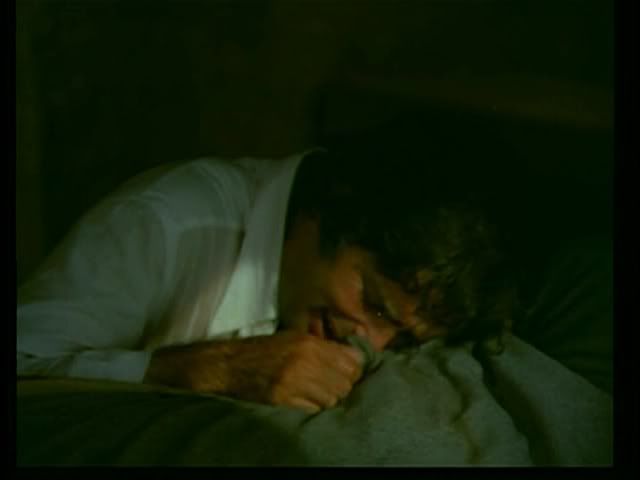
Is Shashi not beautiful? Shashi bahut bahut sundar, hai na? Refer back to the Dance Off(!!) for his possible participation in a Cry Off(!!). The man is gorgeous when he cries.
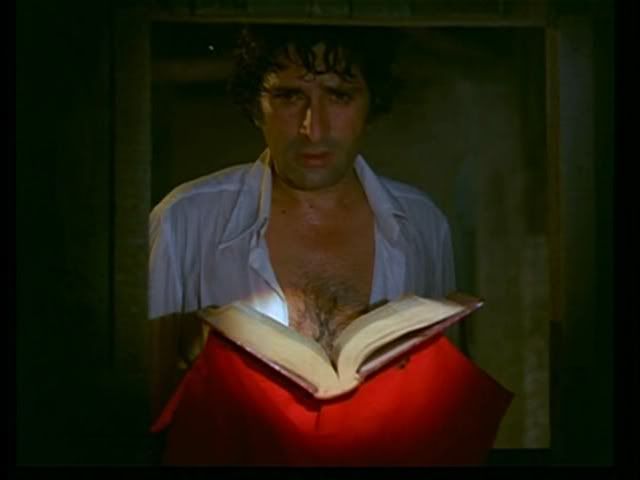
While wet. With his shirt open. Oooh yeah.
OK, sorry.
Anyway, the film plays with its themes of morality and goodness in somewhat surprising ways. For example, there is one sequence when an alcoholic mother (Helen), buys Ahmed's services to pretend to be her daughter's long-lost father. The whole situation is noxious to everyone involved and even Ahmed admits that he finds it abhorrent to lie to children, and that she must leave him alone if he is to do it (he still does it, interestingly). When the woman dies of liver failure, Ahmed tearfully defends her dignity to the hospital staff; seemingly, he has had a change of heart regarding what he thinks of her. But then again, what is being good? Was she good or was she bad? The film seems to lean towards good, even though she was certainly flawed.
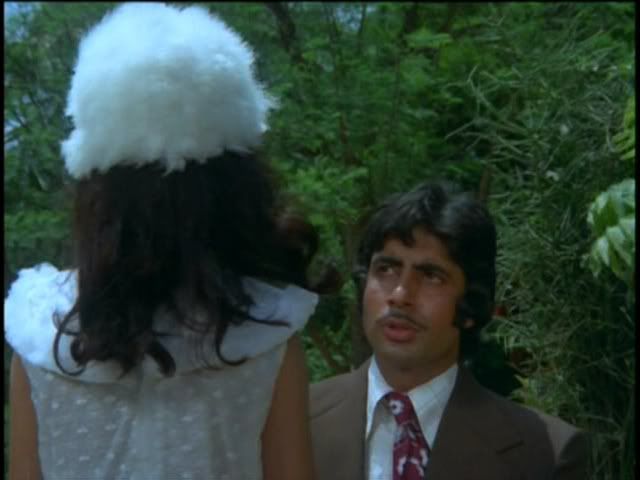
Lying to little girls. Yeah, that's bad.
Similarly, there is an extended sequence in which a charity function benefiting war veterans degenerates into a bizarre sermon-song, where the vets (some of whom are missing legs and arms) sing out their consternation: "Stop patronizing us with your false moral back-patting! We are not helpless!" The charity organizers are duly shamed, while the Holier Than All Sanjeev Kumar looks on with his flashy smile. The PPCC was, of course, infinitely intrigued by all this. What is the film trying to say about goodness here?
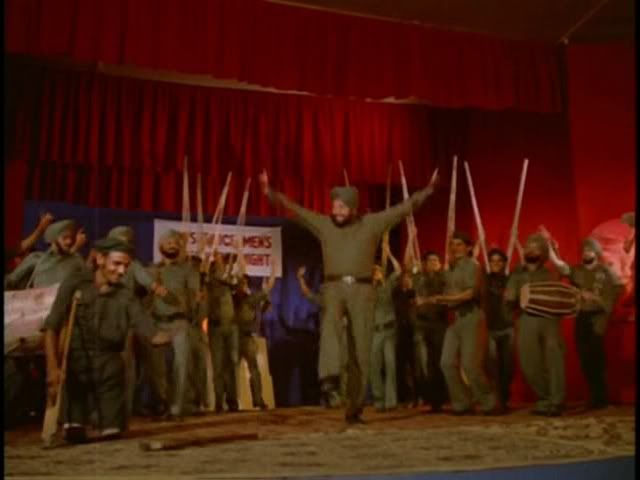
We are the vets and we are empowered.
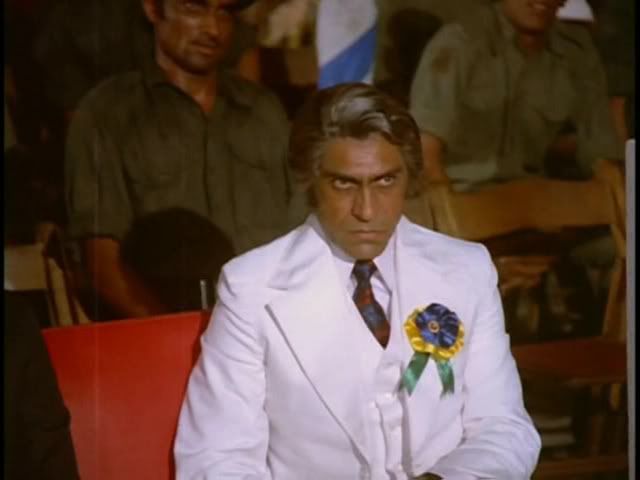
I am the charity organizer and I am shamed.
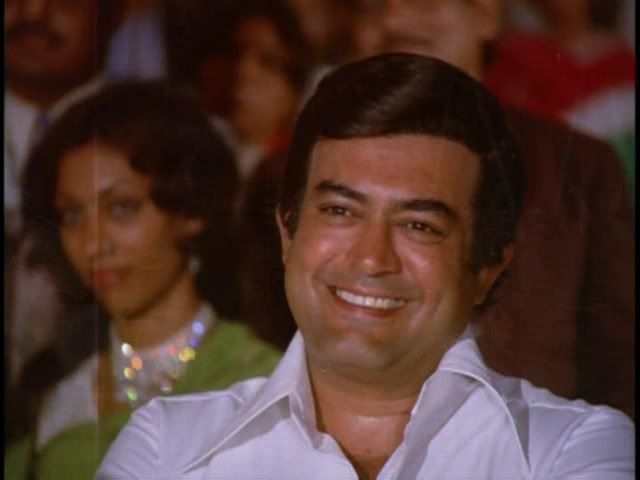
I am the Ultimate Religious Pluralist and I am pleased.
There's even more (the blind friend of Shashi and Amitabh), though we'll let the viewer have his or her own viewing and interpretation. Basically, it seems that the film has a lot going on in its exploration of morality, and at times it can just seem confused and meandering. The PPCC, however, thinks that's the best way to explore morality, as the only character who seems to Have All the Answers (that being Sanjeev Kumar's) ends up alienating the audience. Or at least, he alienated us. Much more compelling are the two good-bad quasi-anti-heroes, Ahmed and Mohan, and how they interact with their world of seemingly endless moral quagmires.
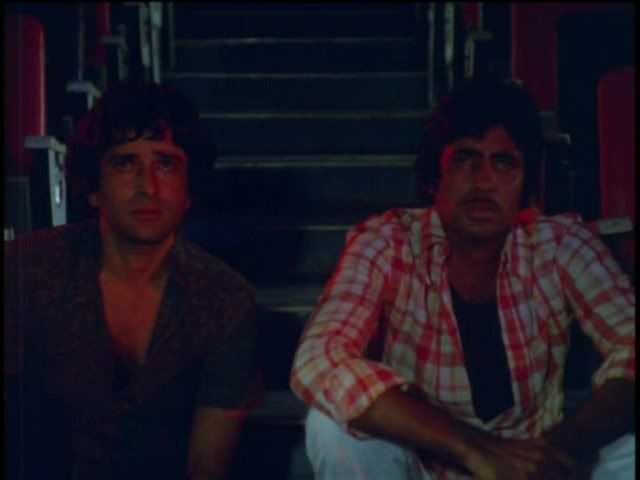
Ahmed and Mohan's visible compassion.
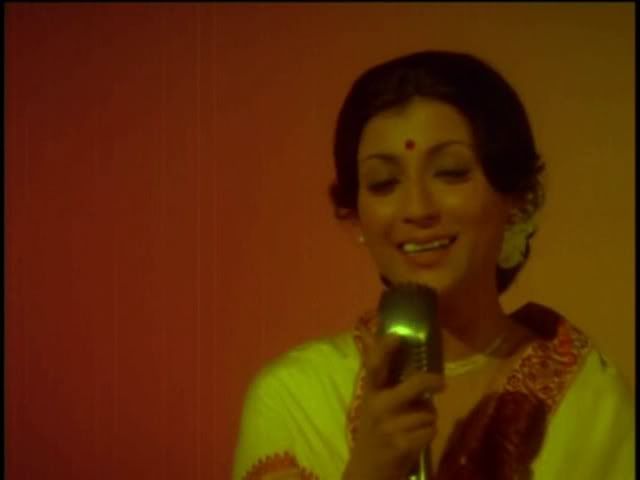
The object of their compassion.
This one's definitely a keeper, but the PPCC must recognize that it is a somewhat peculiar beast and not necessarily widely-appealing. We can easily imagine that critics would say it's ill-defined or too ambiguous or too rambling, and that perhaps this ambiguity bespeaks a lack of direction on the part of Salim and Javed. We, however, loved this aspect most of all, as well as the humble setting. If you liked Kaala Patthar, you'll love Immaan Dharam.


8 comments:
I'm treating this article like it's in National Geographic: pictures first, text later.
1) That's some damn fine Shashi.
2) That's Amrish Puri!
3) Both Bollywood kings - AB and SRK, that is - rarely play Muslims, it appears. Someone needs to analyze this (and I'm sure has). Are their Muslim roles in keeping with demographic statistics for the country? Are they often in movies where there are no major characters who are Muslims? What's going on? V v interesting.
4) Let's do a Amitabh/Shashi jodi project. Let's poll people and find out where they like them best.
The construction site scene looks pretty awesome!
It also looks like they put Rekha in brownface for this film, to play a Tamil character, which made me do a double take. In a country where perceptions of skin tone carry a lot of value judgements, I really wonder at the sub-text when they purposefully darken an actress's face. Well, the sub-text seems obvious: "All Tamils/construction workers are dark!". I wonder more about what the audience makes of this, and whether the film's makers felt the audience would require such make-up on her to buy her role.
It seems a particularly strange thing for Rekha to go along with if it's a perpetuation of a stereotype, since she's South Indian herself. The audience knows what Rekha's real face looks like, and knows that she's a Southern Indian -- yet they need to see her in brownface to accept her as a Tamil character? How ironic.
The only other example I can think of is the red face paint Sunil Dutt wore in Mother India to show what a rough country boy he was
I think PPCC is taking the forgotten gem obsession too far with comparison of 'Deewar' and 'Imaan Dharam'. "Imaan Dharam" is forgotten precisely because it was not a classic. Now if only i could make PPCC members watch Deewar until they get it.
I had written a 500 word rant demanding the resignation of the PPCC president before remembering that thing called 'Freedom of expression'. needless to say,I hate it. :(
Imaan Dharam is from an era when socialism was the buzz word. Everything was under govt. control. big expenditure was actively discouraged. The general thought being that only those involved in illegal activities were the big spenders. The trasnition from Yash Chopra to Karan johar also shows the transition of the Indian society's mindset. PPCC may dislike wet dreams of wealth but the indian middle class, for the first time, had that high lifestyle within its reach in the late 90's. Karan johar showed their dreams on the big screen as Yash Chopra did by putting the affluent business man as the villain. So in that i would compare K3G with 'Imaan Dharam' (if only in term of pattern). I console myself with the thought that some decades later a club would compare DDLJ with K3G and declare the latter to be free of pretensions or 'classic' label and thus prefer it over the former. :D
p.s: I admire PPCC and its views, the above notwithstanding.
Ooh, everyone makes interesting comments about things the PPCC thought about but lazily did not acknowledge! Namely:
Beth: YES, Amrish Puri! And he was so young! And his voice, which I always enjoy hearing as it has that somewhat frantic note to it, was so high and so calm!
Re: AB and SRK rarely playing Muslims, I'm most keen to see SRK play a Muslim because (1) he is Muslim (though he also practices Hinduism) and especially (2) he's so much more lovable playing humble, down-to-earth characters rather than the endless Raj/Rahul prince of wealth. Amitabh may have rarely played Muslims, but he certainly played a lot of poor types! Anyway, a friend accurately captured what the PPCC always thought as well: that the Hinduism in Karan Johar's flicks is more about representing the empowered majority, whereas Islam (a bit like Judaism in the States?) gets relegated to "having more character" and, well, poverty. Amardeep Singh also made some really interesting comments in his review of Maqbool about how Islam is also equated with the criminal underworld.
What's jodi? *PPCC is ashamed*
Nina: aaargghhh, yes! The brownface! I too noticed this and went, "What? But Rekha's southern anyway? What is this madness?" Perhaps it's because Rekha's image was always as the Muslim courtesan (see Umrao Jaan, Muqaddar ka Sikandar, Suhaag), usually from Lucknow or some other northern city. So southern she may be, but her cinematic ego was northern?
Also, *insert color*face is always a bit cringe-worthy, though I suppose it's not any worse than putting on a fake accent. Apropos, is she putting on a really thick accent or anything? I know she's interjecting with a lot of Tamil (hence the segue into the gloriousness of Koncam Koncam!).
Abhi - arrgrhh, yes, please try to convert the PPCC to Deewaar, because even the PPCC recognizes that it is quite good and we're being philistines about it. Especially after reading those interesting reviews by Iowa and others, about it's Cain and Abel-esque warring brothers and all the emotional intricacies. The PPCC actually re-watched it the other day in an attempt to like it (I mean, we reeeally sat down and focused and went, "Like it! Like it! Like it!") and we have come to the conclusion that the reason it has never moved us very much is our lack of identification with Amitabh's character. Cruel this may be, but I just don't care what happens to Vijay and hence, with the whole tragic dennouement, I'm thinking more about why Shashi has such short hair than why Ravi is such a terrifying creature of mixed-up motivations and how life's so ironic and hard for Vijay.
Moving on, the note about socialism vs. a loving embrace of capitalism and the growth of the middle class is interesting! That makes perfect sense, hence why DDLJ is also such a turning point, no? The diaspora finally gets its say! And this may actually be as class-centric as it is ethnocentric to call India "an exotic, colorful land full of meditating gurus", but the PPCC, bourgeoise as it is (!), has a thing for poverty on film. We just think it's got more character than Yash Chopra's/Karan Johar's palaces. Though we admit there's nothing intrinsically more appealing than one or the other.
(And comparing K3G with Immaan Dharam?! *dies*)
Angry letters demanding one of our members' resignation are always welcome! Though we don't have a president, we have a hereditary dictatorship. But we expected it by admitting we prefer Immaan Dharam (or Kaala Patthar... or Suhaag...) to Deewaar which is, suffice to say, a pretty unpopular opinion.
A couple, a pairing.
Interesting re: religion/character. It certainly worked in The Nanny.
Whenever *insert color*face comes up, I have to point out the Hindi version of Khushi, in which there is both blackface and, for lack of a better word, Latinoface.
Forgot how good this movie was but like abhi said - I never forgot how good 'Deewaar' was ;) Amitji in moustached roles was something I never got quite used to. The major actors merely play roles (like Beth said) that showcase the demographics of India - unless you count the period pieces of course.
Off the top of my head Amitabh played Muslims in several movies in addition to this one - Coolie, Andhaa Kaanoon & Naseeb (where he was all three!). I really do enjoy it when a Muslim character is in a movie and wonder how the Muslims in India & Pakistan feel about it. The friends I have spoken to say while they obviously relate more when that occurs it really doesn't make much of an impact in their Bollywood watching.
Wah, wah, wah !
You have taken far greater pains analysing this movie that what the makers of this movie took.
I could not stand watching "Masoom" a second time, that is how moving I found that movie.
I cannot stand to watch "Imaan Dharam". I guess that makes it somewhat like "Masoom" for those who are into reading between lines.
Great review. I hope you have posted reviews on movies like "Do aur Do panch", " Solah shukrawar" etc too here.
Thanks for the review of my father Desh Mukerji's film, Imaan Dharam. I have given a link to your site from our webpage. http://www.subcontinent.com/misc/desh_mukerji/desh.html
Post a Comment